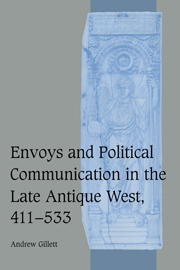Book contents
- Frontmatter
- Contents
- List of tables
- Preface
- List of abbreviations
- Chronological table
- Maps
- 1 EMBASSIES AND POLITICAL COMMUNICATION IN THE POST-IMPERIAL WEST
- 2 THE PROVINCIAL VIEW OF HYDATIUS
- 3 THE HERO AS ENVOY: SIDONIUS APOLLINARIS' PANEGYRIC ON AVITUS
- 4 THE SAINT AS ENVOY: FIFTH- AND SIXTH-CENTURY LATIN BISHOPS' LIVES
- 5 CASSIODORUS AND SENARIUS
- 6 NEGOTIUM AGENDUM
- CONCLUSION
- Appendix I Chronology of Constantius, Vita Germani
- Appendix II Chronology of the life of Epiphanius of Pavia
- Appendix III Senarius' Letters of Appointment: Cassiodorus, Variae IV, 3 and 4
- Appendix IV The text of Senarius' Epitaph
- Note on editions, commentaries, and translations of major sources
- Bibliography
- Index
- Cambridge Studies in Medieval Life and Thought Fourth series
CONCLUSION
Published online by Cambridge University Press: 12 July 2009
- Frontmatter
- Contents
- List of tables
- Preface
- List of abbreviations
- Chronological table
- Maps
- 1 EMBASSIES AND POLITICAL COMMUNICATION IN THE POST-IMPERIAL WEST
- 2 THE PROVINCIAL VIEW OF HYDATIUS
- 3 THE HERO AS ENVOY: SIDONIUS APOLLINARIS' PANEGYRIC ON AVITUS
- 4 THE SAINT AS ENVOY: FIFTH- AND SIXTH-CENTURY LATIN BISHOPS' LIVES
- 5 CASSIODORUS AND SENARIUS
- 6 NEGOTIUM AGENDUM
- CONCLUSION
- Appendix I Chronology of Constantius, Vita Germani
- Appendix II Chronology of the life of Epiphanius of Pavia
- Appendix III Senarius' Letters of Appointment: Cassiodorus, Variae IV, 3 and 4
- Appendix IV The text of Senarius' Epitaph
- Note on editions, commentaries, and translations of major sources
- Bibliography
- Index
- Cambridge Studies in Medieval Life and Thought Fourth series
Summary
Formal embassies were an aspect of public life which continued from the later Roman empire through the fifth and sixth centuries into the time of the early medieval kingdoms. Originating in the exchanges of civitates before the rise of Roman hegemony, the ‘internal diplomacy’ of embassies played a fundamental part in the administration of the Roman empire. Cities, provincial councils, and other bodies communicated directly with the emperor and his senior magistrates, raising and resolving issues outside those addressed by bureaucratic administration, and maintaining the political cohesion of the vast empire through regular affirmations of loyalty. The conventions of the Second Sophistic, which flourished in the first and second centuries ad with a resurgence in the newly Christian empire of the fourth century, formalised the rhetorical practices of embassies, while imperial legislation regulated their conduct in regard to access to imperial officials, obligations and recompense for envoys, and the provision of state facilities to assist the undertaking of the journeys involved. Municipal and provincial embassies were thus officially coopted into the machinery of government. This system of internal communication was important to the functioning not only of the empire as a whole, but also of local society, where the successful completion of the burden of undertaking legations brought social advantage through prestige and perhaps rewards from the emperor. The traffic in embassies was essentially one-way: embassies from cities and provinces approached the imperial centre and returned with the authority's reply.
- Type
- Chapter
- Information
- Publisher: Cambridge University PressPrint publication year: 2003

